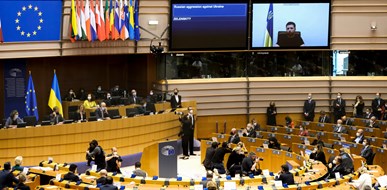[CLEER Paper Series] The legal implications of the EU's geopolitical awakening
Published 7 April 2025
Image by Alexandros Michailidis
Against the backdrop of a growing trade war with the United States, a timely new paper series examines the European Union's move towards 'strategic autonomy'. Edited by Asser Institute researchers Narin Idriz, Eva Kassoti, and Joris Larik (Leiden University), the volume explores the legal implications of its shift from 'soft power' to 'hard power' in a rapidly changing global landscape.
The series, titled "The Legal Implications of the EU's Geopolitical Awakening," is a collaboration between the Asser Institute and Leiden University. It analyses how the EU is transitioning from its traditional self-perception as a 'soft power' to developing 'hard power' capabilities across multiple policy domains, examining what has been dubbed the EU's 'geopolitical law.'
Where in the past national security was a matter for individual nations, and international security required cooperation between them, today's global economy, in which security and economics are tightly linked, has given the European Commission the authority to take stronger actions. The new paper series clearly demonstrates how trade, investment, competition, and technology have become strategic areas for the European Union with direct security consequences.
Geopolitical awakening
The EU's "geopolitical awakening" in security and defense, revealing a shift towards "hard power," was dramatically accelerated by Russia's full-scale invasion of Ukraine in February 2022. The editors, however, note that this transformation was already well underway before the invasion, driven by economic challenges from China and tensions with the United States during the Trump presidency of 2017-2021.
Pre-invasion developments like PESCO (Permanent Structured Cooperation) and the European Defence Fund (EDF) laid the groundwork for increased collaboration and investment in defense capabilities. Russia's invasion of Ukraine, however, triggered unprecedented actions, including extensive sanctions against Russia, the transformation of the European Peace Facility (EPF) to provide military aid to Ukraine, and the establishment of a dedicated Ukraine Assistance Fund.
Furthermore, initiatives like the Act in Support of Ammunition Production and joint defense procurement mechanisms demonstrate the EU's commitment to bolstering its defense industry and supporting Ukraine. The growing concern about future US foreign policy further emphasises the EU's drive for greater strategic autonomy and defense integration.
Critical raw materials
The publication covers three main themes, featuring eight papers. The first section examines the European Union's move to geoeconomic instruments, including the Foreign Subsidies Regulation, Investment Screening Regulation, export controls, and the Critical Raw Materials Act (CRMA). Access to reliable and affordable critical raw materials is crucial for the EU, for the success of its energy transition and its sustainability agenda, and the risks posed by economic interdependencies and supply chain vulnerabilities have led the EU to adopt the CRMA.
Through the case study of the EU-Ukraine Strategic Partnerships on Raw Materials, author Cecilia Nota demonstrates how the EU aims to integrate critical raw materials value chains, diversify supply sources, and mitigate vulnerability to supply disruptions. However, Nota argues that the non-binding nature of these partnerships, coupled with the diverse interests of partner countries, cast a shadow on their effectiveness.
Strategic autonomy
The second section of the CLEER paper explores developments in security and defence policy, including the concept of strategic autonomy and the EU's mutual assistance and solidarity clauses. Through an examination of recent developments in the Russia-Ukraine conflict, authors Karetsos and Bakos investigate whether the EU acts autonomously in the security and defence sphere, arguing that although significant steps have been taken towards realising the EU's strategic autonomy agenda, this has yet to materialise fully. The authors highlight the potential of the EU's defense industrial policies to act as a tool for integrating security and foreign policy considerations in a Strategic Autonomy doctrine.
The final section of the publication addresses specific challenges arising from Russia's invasion of Ukraine, including energy security and legal questions surrounding the potential confiscation of Russian Central Bank assets. Contributors analyse how the EU is leveraging trade, investment, and industrial policy tools to protect its strategic interests while attempting to remain committed to its founding values and international law. The publication highlights the significant legal implications of this shift, with particular attention to how economic and security policies have become increasingly entangled.
The CLEER publication "The legal implications of the EU's geopolitical awakening" is the result of two rounds of PhD workshops organised at the Asser Institute and Leiden University in 2024, with the generous financial assistance of the Municipality of The Hague.
The series offers valuable insights for researchers, policymakers, and practitioners interested in understanding how the EU is adapting its legal frameworks to address a rapidly changing geopolitical landscape while navigating tensions between strategic autonomy and multilateral cooperation.
Read the full publication.
About CLEER
Academic research network CLEER, established in 2008 and powered by the Asser Institute, offers tools for understanding EU external action through law and policy. The unique network is linking practitioners and academics, fostering joint research and collaboration. CLEER connects leading EU experts, publishes peer-reviewed papers, and hosts events. Its multidisciplinary expertise spans EU law, international relations, and governance, with members experienced in training and consultancy. Read more.
[CLEER Summer school] EU External Action Law
Dive into EU external relations at CLEER’s 10th annual summer school in Brussels this summer. Join renowned experts and practitioners for interactive lectures and discussions at VUB, June 23-25, 2025. Explore key topics, from digital governance to EU enlargement, and gain insights from a visit to the EEAS, the EU’s diplomatic service. Apply now for an immersive experience in EU law and policy, and network with future leaders. Scholarships available. Register today! Read more.



